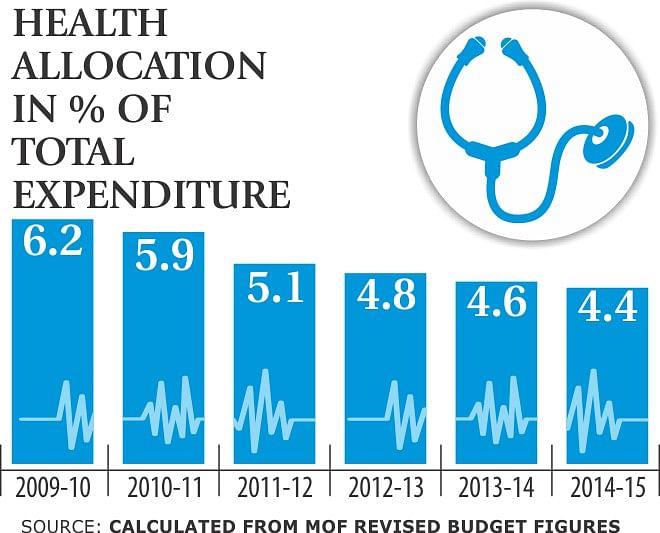Health not well at all

The World Health Organisation suggests that the health budget be at least 15 percent of total budget. In Bangladesh, it is only 4.60 percent of the current budget, which is going to decline further to 4.45 percent in the next year's budget.
The finance minister yesterday proposed Tk 11,146 crore for health budget -- which is up from the current year's revised budget of Tk 9,955 crore but down in share of total budget.
This goes against the government's health financing strategy to up the allocation for health to 15 percent by 2032 to ensure quality and affordable healthcare for all.
The declining trend that started from 6.18 percent in 2009-10 continues amid rising healthcare costs in Bangladesh, where people spend 64 percent of total health costs from their own pocket against the global status of 32 percent.
The high private health expenditure pushes 4 to 5 million people into poverty every year, while many fail to seek healthcare, according to the National Health Account 2011.
The per capita health spending, which is only $27 in Bangladesh, is the lowest in the region despite high malnutrition and mortality rates.
Nearly 39 percent children under five are stunted and 35 percent underweight, while maternal mortality rate is 194 per one lakh live births.
The under-five child mortality rate is 53 per lakh, which is 43 per lakh among the infants in Bangladesh.
"The proposed health budget is frustrating. Because per capita health spending must go down if increased population, salaries for the health ministry staff and inflation are counted," said Dr Abdul Matin, a member of Bangladesh Health Rights Movement.
Despite rising health burdens caused mainly by non-communicable diseases like cancer, diabetes and hypertension, the successive governments are not paying enough attention to the health sector, which is crucial in improving the quality of human resources, he said.
"While increasing the health allocation is of utmost importance, the government must check corruption and make better utilisation of its money," Dr Matin added.
SURCHARGE ON TOBACCO
Muhith yesterday proposed to impose one percent 'Health Development Surcharge' on all imported and domestically produced tobacco products, but health experts said the idea of its utilisation was not clear.
The fund received from the surcharge would be used for treatment and rehabilitation of tobacco disease-stricken people, he said, adding that nearly 60,000 people die and 4 lakh people become crippled every year in Bangladesh due to smoking.
Dr Rashid-E-Mahbub, former president of Bangladesh Medical Association, however, posed a question: "How will the government determine who is tobacco disease-stricken?”
It would be best if the fund is set aside for cancer hospitals or used to prevent and reduce tobacco use, he said.

 For all latest news, follow The Daily Star's Google News channel.
For all latest news, follow The Daily Star's Google News channel. 



Comments